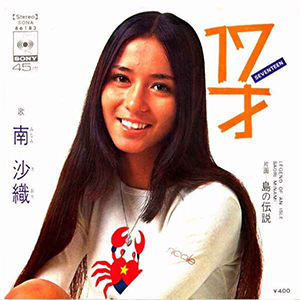 W
W"17-sai" is the debut single by Japanese singer Saori Minami. Written by Mieko Arima and Kyōhei Tsutsumi, the single was released by CBS Sony on June 1, 1971. Tsutsumi based the song on "Rose Garden" by Lynn Anderson when he learned it was Minami's favorite song. Arima, who was 40 years old at the time, surprised her close friends when she was able to express the feelings of a 17-year-old girl in the song's lyrics.
 W
W"Alone" is the fifth single by Japanese singer/songwriter Chisato Moritaka. The lyrics were written by Chisato Moritaka, the music was composed and arranged by Shinji Yasuda. The single was released by Warner Pioneer on October 25, 1988.
 W
W"Ame" is the 11th single by Japanese singer/songwriter Chisato Moritaka. The lyrics were written by Moritaka and the music was composed by Seiji Matsuura. The single was released by Warner Pioneer on September 10, 1990. A remix of the song, titled "Ame ", was released alongside "Watarasebashi" by zetima on November 25, 2009.
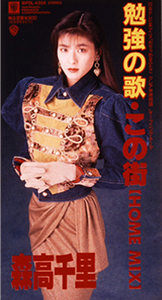 W
W"Benkyō no Uta" is the 12th single by Japanese singer/songwriter Chisato Moritaka. The lyrics were written by Moritaka and the music was composed by Hideo Saitō, the single was released alongside "Kono Machi " by Warner Pioneer on February 10, 1991. The song was used as the opening theme of the 1991 anime TV series Mischievous Twins: The Tales of St. Clare's.
 W
W"Concert no Yoru" is the 15th single by Japanese singer/songwriter Chisato Moritaka. Written by Moritaka and Hideo Saitō, the single was released by Warner Music Japan on February 25, 1992.
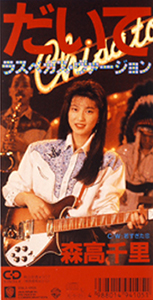 W
W"Daite" is the eighth single by Japanese singer/songwriter Chisato Moritaka. Written by Moritaka and Yuichi Takahashi, the single was released by Warner Pioneer on September 25, 1989. The song marked a departure from her previous pop singles, using a 1960s classic rock style. It is included in the 1991 remix album The Moritaka.
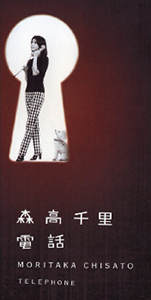 W
W"Denwa" is the 35th single by Japanese singer/songwriter Chisato Moritaka. Written by Moritaka and Yuichi Takahashi, the single was released by One Up Music on March 4, 1998. The song was used in a Kanebo Sala shampoo commercial featuring Moritaka. The B-side is "Dragon", an instrumental track.
 W
W"Fight!!" is the 14th single by Japanese singer/songwriter Chisato Moritaka. The lyrics were written by Moritaka and the music was composed by Yuichi Takahashi. The single was released by Warner Music Japan on October 25, 1991. The '70s-style rock song was used as an image song for the 1991 FIVB Volleyball Men's World Cup, which was held in Tokyo.
 W
W"Futari wa Koibito" is the 25th single by Japanese singer/songwriter Chisato Moritaka. The lyrics were written by Chisato Moritaka, the music was composed and arranged by Hideo Saitō. The single was released by One Up Music on February 10, 1995. The song was used as the theme of the NTV drama series Koi no 2-dome Nara .
 W
W"Get Smile" is the third single by Japanese singer Chisato Moritaka. Written by Hiromasa Ijichi and Ken Shima, the single was released by Warner Pioneer on February 25, 1988.
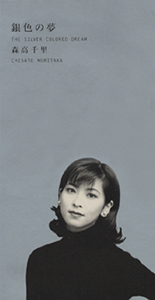 W
W"Gin'iro no Yume" is the 30th single by Japanese singer/songwriter Chisato Moritaka. Written by Moritaka and Hiromasa Ijichi, the single was released by One Up Music on November 11, 1996. The song was used for TV commercials promoting Meiji's Melty Kiss chocolate.
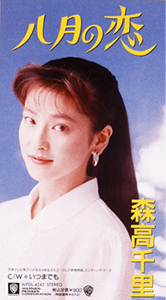 W
W"Hachigatsu no Koi" is the 13th single by Japanese singer/songwriter Chisato Moritaka. Written by Moritaka and Kyōhei Tsutsumi, the single was released by Warner Pioneer on June 25, 1991.
 W
W"Hae Otoko" is the 19th single by Japanese singer/songwriter Chisato Moritaka. Written by Moritaka, the single was released with "Memories" by Warner Music Japan on June 25, 1993. Both songs were used in the Fuji TV variety show Utchan Nanchan no Yarunara Yaraneba! .
 W
W"Ichido Asobi ni Kite yo '99" is the 40th single by Japanese singer/songwriter Chisato Moritaka. Written by Moritaka and Hideo Saitō, the single was released by zetima on October 1, 1999. It is a re-recording of the song from Moritaka's 1994 album Step by Step. The song was Moritaka's final single before her retirement following her marriage to actor Yōsuke Eguchi and her pregnancy at the end of 1999.
 W
W"Jin Jin Jingle Bell" is a Christmas song and the 27th single by Japanese singer/songwriter Chisato Moritaka. Written by Moritaka, the single was released by One Up Music on December 1, 1995. The song is a modified version of "Gin Gin Gin", which Moritaka wrote for a Suntory Ice Gin commercial. The first B-side is "Gin Gin Gingle Bell", which was used for the Suntory Ice Gin Christmas commercial that year. The second B-side is Moritaka's cover of "Ichigatsu Ichijitsu", a popular Japanese New Year's Day song.
 W
W"Kaze ni Fukarete" is the 20th single by Japanese singer/songwriter Chisato Moritaka.The lyrics were written by Moritaka and the music was composed by Hideo Saitō. The single was released by One Up Music and Warner Music Japan on October 11, 1993. It became her first of two singles to hit No. 1 on Oricon's singles chart.
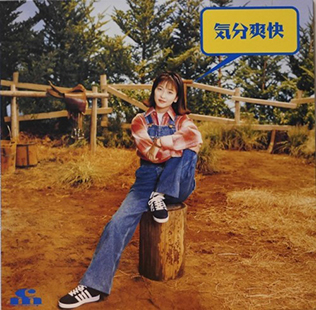 W
W"Kibun Sōkai" is the 22nd single by Japanese singer/songwriter Chisato Moritaka. Written by Moritaka and Kenichi Kurosawa, the single was released by One Up Music on January 31, 1994. The song was used by Asahi Breweries for commercials promoting Asahi Z beer.
 W
W"Kumamonmon" (くまモンもん) is a single released by zetima on September 25, 2013, to promote the Kumamoto Prefecture mascot Kumamon and celebrate his third birthday. The single was released in two formats: CD only and CD + DVD.
 W
W"Kusai Mono ni wa Futa wo Shiro!!" is the 10th single by Japanese singer/songwriter Chisato Moritaka. Written by Moritaka and Hideo Saitō, the single was released by Warner Pioneer on May 25, 1990. Known for its unique rockabilly tune, the song was used in a Pioneer cordless phone commercial featuring Moritaka.
 W
W"La La Sunshine" is the 29th single by Japanese singer/songwriter Chisato Moritaka. The lyrics were written by Moritaka and the music was composed by Hiromasa Ijichi. The single was released by One Up Music on June 10, 1996. The song was used as the opening and ending theme of Fuji TV's news magazine program Mezamashi TV from April 1, 1996 to March 28, 1997. The single was re-released by zetima on April 16, 2008 with a bonus DVD containing the music video to coincide with the song's use by Kao Corporation for a Blaune hair coloring commercial featuring Moritaka.
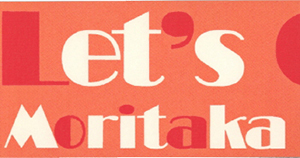 W
W"Let's Go!" is the 31st single by Japanese singer/songwriter Chisato Moritaka. Written by Moritaka and Hiromasa Ijichi, the single was released by One Up Music on February 25, 1997. Two versions of the single were released: an 8 cm CD single and an EP version on 12-inch LP - both wth different tracks. The song was used by Lawson for their store commercials.
 W
W"Mahiru no Hoshi" is the 39th single by Japanese singer/songwriter Chisato Moritaka. Written by Moritaka and Shikao Suga, the single was released by Media Factory on May 19, 1999. The song was used as the ending theme of the Hong Kong/Japanese romance film Moonlight Express.
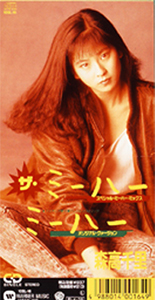 W
W"The Mi-ha" is the fourth single by Japanese singer/songwriter Chisato Moritaka. Released by Warner Pioneer on April 25, 1988. The lyrics were written by Chisato Moritaka, the music was composed and arranged by Hideo Saitō. The single was Moritaka's first foray in songwriting in her career. The song was used in a series of Pioneer answering machine telephone commercials featuring Moritaka.
 W
W"Michi" is the ninth single by Japanese singer/songwriter Chisato Moritaka. The lyrics were written by Moritaka and the music was composed by Shinji Yasuda. The single was released alongside "Seishun" by Warner Pioneer on January 25, 1990. "Michi" was used in a Glico Pocky commercial featuring Moritaka, while "Seishun" was used in the NTV drama series Ikenai Joshikō Monogatari .
 W
W"Miracle Light" is the 33rd single by Japanese singer/songwriter Chisato Moritaka. Written by Moritaka and Harry Hosono, the single was released by One Up Music on October 15, 1997.
 W
W"Natsu no Hi" is the 23rd single by Japanese singer/songwriter Chisato Moritaka. The lyrics were written by Moritaka and the music was composed by Hideo Saitō. The single was released by One Up Music on May 10, 1994. The song was used as the ending theme of TV Tokyo's variety show Asakusabashi Young Yōhinten.
 W
W"New Season" is the debut single by Japanese singer Chisato Moritaka. Written by HIRO and Hideo Saitō, the single was released by Warner Pioneer on March 25, 1987. The song was used as the theme song of the 1987 Toho film Aitsu ni Koishite, which also featured Moritaka's acting debut. It was also featured in the Fuji TV drama special Gakuen Jōhōbu H.I.P. , also starring Moritaka.
 W
W"Overheat Night" is the second single by Japanese singer Chisato Moritaka. Written by Hiromasa Ijichi and Hideo Saitō, the single was released by Warner Pioneer on October 25, 1987. In contrast to the pop rock sound of Moritaka's debut single "New Season", the song uses a dance-pop arrangement.
 W
W"Rock'n Omelette" is a children's song and the 21st single by Japanese singer/songwriter Chisato Moritaka. Written by Moritaka and Hiromasa Ijichi, the single was released by One Up Music on January 25, 1994. The song was used as the first opening theme of the Fuji TV children's show Ponkickies and was featured in the 1995 various artists album Ponkickies Melody. The cover art was illustrated by Lily Franky.
 W
W"Snow Again" is the 34th single by Japanese singer/songwriter Chisato Moritaka. Written by Moritaka and Yuichi Takahashi, the single was released by One Up Music on November 19, 1997. The song was used for TV commercials promoting Meiji's Melty Kiss chocolate.
 W
W"So Blue" is the 28th single by Japanese singer/songwriter Chisato Moritaka. Written by Moritaka and Hiromasa Ijichi, the single was released by One Up Music on February 19, 1996. The song was used as the opening theme of the TBS music series Count Down TV.
 W
W"The Stress" is the sixth single by Japanese singer/songwriter Chisato Moritaka. The lyrics were written by Moritaka and the music was composed by Hideo Saitō. The single was released by Warner Pioneer on February 25, 1989. The full title of the single is "The Stress -Stress Chūkintō Version-" , a remix of "Stress" with Middle Eastern-style synthesizer arrangements.
 W
W"Suteki na Tanjōbi" is the 24th single by Japanese singer/songwriter Chisato Moritaka. Written by Moritaka and Yuichi Takahashi, the single was released with "Watashi no Daiji na Hito" by One Up Music on October 10, 1994. It became her second of two singles to hit No. 1 on Oricon's singles chart.
 W
W"Sweet Candy" is the 32nd single by Japanese singer/songwriter Chisato Moritaka. Written by Moritaka and Yuichi Takahashi, the single was released by One Up Music on June 11, 1997. The song was used by Lawson for their store commercials. The B-side is "Mirai", which was used at the 54th National Sports Festival in Moritaka's hometown of Kumamoto.
 W
W"Tsumetai Tsuki" is the 37th single by Japanese singer/songwriter Chisato Moritaka. Written by Moritaka and Yuichi Takahashi, the single was released by zetima on October 1, 1998. The song was used as an image song for NTV's booth at the 1998 Museum of Fine Arts Exhibition at the Musée de l'Orangerie in Paris to commemorate the network's 45th anniversary.
 W
W"Umi made 5-fun" is the 36th single by Japanese singer/songwriter Chisato Moritaka. Written by Moritaka and Toshinobu Kubota, the single was released by zetima on July 15, 1998. It is the theme song of the TBS drama of the same name. The song was also used in a 2010 Panasonic camcorder commercial featuring Moritaka.
 W
W"Watarasebashi" is the 17th single by Japanese singer/songwriter Chisato Moritaka. The lyrics were written by Moritaka and the music was composed by Hideo Saitō. The single was released alongside "Writer Shibō" by Warner Music Japan on January 25, 1993. The song was used as the theme song to the TX variety show Ii Tabi: Yume Kibun.
 W
W"Watashi ga Obasan ni Natte mo" is the 16th single by Japanese singer/songwriter Chisato Moritaka. The lyrics were written by Moritaka and the music was composed by Hideo Saitō. The single was released by Warner Music Japan on June 25, 1992.
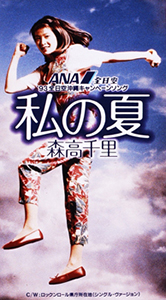 W
W"Watashi no Natsu" is the 18th single by Japanese singer/songwriter Chisato Moritaka. The lyrics were written by Moritaka and the music was composed by Hideo Saitō. The single was released by Warner Music Japan on April 10, 1993. The song was used by All Nippon Airways for their "ANA Okinawa" campaign.
 W
W"Watashi no Yō ni" is the 38th single by Japanese singer/songwriter Chisato Moritaka. Written by Moritaka and Shin Kōno, the single was released by zetima on March 17, 1999. The song was used by Kirin for their Naturals smoothies commercials.
 W
W"Yasumi no Gogo" is the 26th single by Japanese singer/songwriter Chisato Moritaka. Written by Moritaka and Hideo Saitō, the single was released by One Up Music on October 10, 1995. The song was used as the ending theme of the TV Tokyo drama series Iitabi Yume Kibun . The single marked Moritaka's final collaboration with Saitō, whom she had worked with since her debut single "New Season" in 1987.
 W
W"Yoru no Entotsu" is the debut single by Japanese rock band Carnation. Written by band founder Masataro Naoe, the single was released independently in November 1984. The band re-recorded the song for the CD release of their 1988 album Gong Show. They once again re-recorded the song in 2004 as the B-side of their 20th anniversary single "Angel".